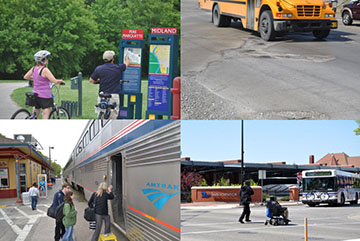
There are many transit options in Michigan and a complete transportation funding program would support all of them.
In a huge vote, the Michigan Senate has just passed HB 5477, a bill that would phase in a new percentage-based gasoline tax that will result in an additional $1.2 billion for transportation funding by 2019. Revenue from other bills in this package result in transportation increases as high as $1.5 billion annually once fully phased in.
The bill would replace the current cents per gallon structure, which is 19 cents per gallon on gasoline and 15 cents per gallon on diesel fuel. Under the bill, the percentage tax on gas would start at 9.5 percent as of April 1, 2015. It would increase to 11.5 percent on January 1, 2016; to 13.5 percent on January 1, 2017; and to 15.5 percent on January 1, 2018.
Thank you to all of our members who reached out to their Senator asking them to support this important legislation. The bill will now need to be approved by the House. Our advocacy efforts cannot end here. We encourage you to immediately begin reaching out to your House member and ask them to vote yes on House Bill 5477 as approved by the Senate.
John LaMacchia is a Legislative Associate for the League handling transportation and infrastructure issues. He can be reached at jlamacchia@mml.org or 517-908-0303.





